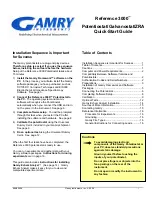
Operator’s Manual
EAR99 technology subject to restrictions on copyrights page.
37
Appendix A: Battery Safety and Handling
The HVFO108 incorporates a rechargeable Lithium Polymer battery. The battery pack should
have enough protection for an ICP cell from the specification of its electrical, mechanical and
environmental characteristics.
Always follow the instructions below when using the probe.
DANGER
Using the HVFO108 probe other than according to the UL1642 safety requirements listed here
may cause electrical bursts, fire, smoke or severe performance failure making it unsafe for use.
(1)
Do not disassemble or modify the probe body.
The battery has a safety function and
protection circuit to avoid danger of electrical fire. The ICP cell is packaged in aluminum
laminated plastic film which can be easily damaged by sharp instruments such as pins, needles,
edge of devices like nickel tabs, etc. If the film is seriously damaged, electrolyte leakage or
short-circuit between positive and negative tabs, etc., could occur.
(2) Do not incinerate or heat the probe.
Do not use or leave it near fire, stove or heated surfaces
(more than 130 °C). Doing so can melt the battery insulator, damage the safety function, or
ignite electrolytes. If the polymer separator is melted, an internal short-circuit can occur in
individual cells.
(3) Do not place the probe in a microwave or a high-pressure container.
Heat can damage the
battery’s protective mechanisms.
(4) Do not use the probe near fire or other heat sources.
If liquid leaks from the battery, or you
smell noxious fumes, remove the battery from nearby heat sources immediately.
(5) Do not use the probe near static electricity.
Static electricity of more than 100 V can damage
the battery’s internal protection mechanisms.
(6) Do not expose the probe to direct ultrasonic wave power or solder near the battery.
Soldering
near the battery may melt and damage components such as separator and insulator.
(7) Do not drive nails or sharp objects into the probe, strike it with a hammer or other object, or
step on it.
A deformed or broken battery can short-circuit.
(8) Do not throw the probe or cause excessive impact.
ICP batteries can be damaged by strong
mechanical shock causing wire breakage, short-circuits inside the cell, leakage of electrolytes,
etc. If the battery’s protective mechanisms are broken, the battery will be charged at an
abnormal voltage or current, and an abnormal chemical reaction can occur.
Содержание HVFO108
Страница 1: ...Operator s Manual HVFO108 High Voltage Fiber Optically Isolated Probe ...
Страница 2: ......
Страница 3: ...HVFO108 High Voltage Fiber Optically Isolated Probe Operator s Manual June 2020 ...
Страница 47: ......
Страница 48: ...932301 00 Rev A June 2020 ...






































